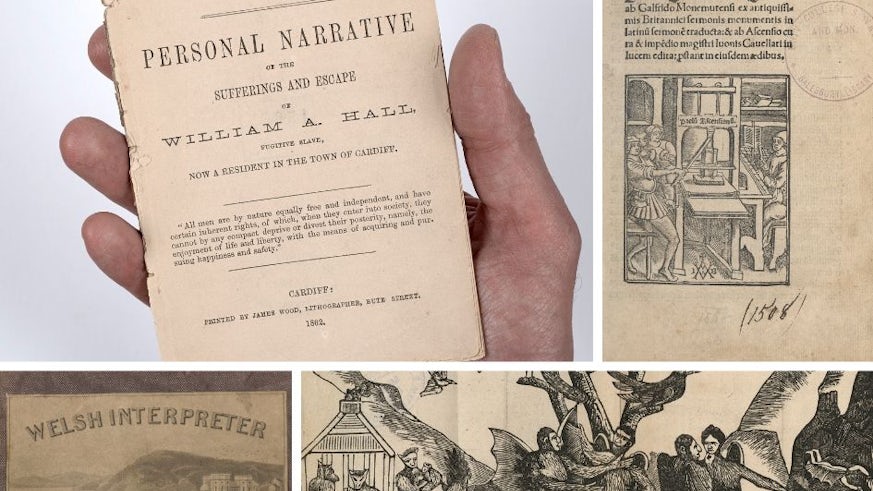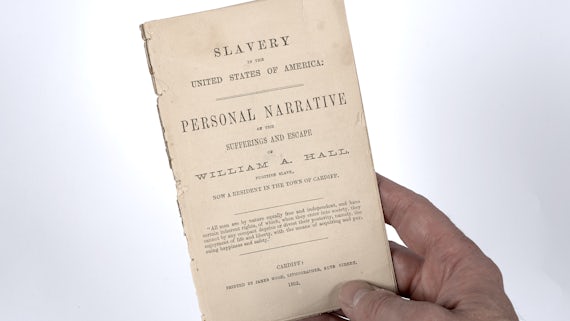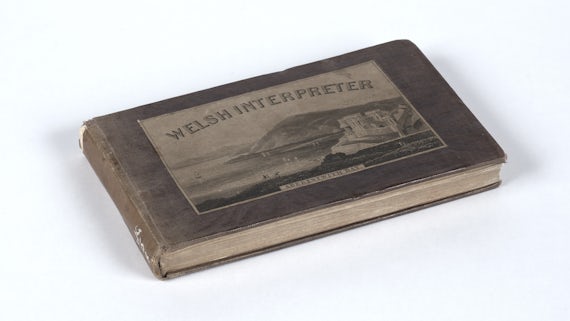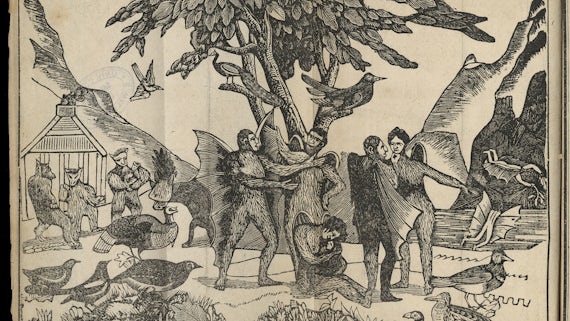Eccentric creator of ‘alternative national library’ celebrated
6 November 2019

The life of a maverick Welsh collector who built the first major collection of books about Wales is being celebrated 200 years after his birth.
Enoch Salisbury, born on 7 November 1819, created a collection of over 18,000 books about Welsh culture, politics, language, geography and beyond.
Highlights include a rare piece of black Welsh history, a less than sensitive phrasebook for English travellers in Wales and the scribbles of a noted Welsh forger and cultural pioneer.
Salisbury’s collection was described at the time as the “most comprehensive collection of works relating to Wales and its people ever made”.
Despite this recognition he failed to build a national library - which was eventually established in Aberystwyth years later with a different collection - and was declared bankrupt.
Members of the public are invited to an event at Cardiff University, where the Salisbury collection is now housed, to mark what would have been his 200th birthday.
Head of Special Collections at Cardiff University Libraries, Alan Vaughan Hughes, said: “We joke that it’s the ‘alternative national library’ – but what Salisbury did was visionary.
“He saw the need to start collecting books about Wales, long before the national institutions we take for granted today. And he just went and did it!
He was so much more than an eccentric book collector – he created an amazing picture of our culture, our literature, politics, geography and much more. It’s about time we celebrated Salisbury and his contribution to Welsh life.
The collection, which features books in English and Welsh, is wide ranging with many highlights which include:
- William Hall’s Slave Narrative: a book in which William Hall recounts his escape from slavery in the American south, which ends with his settling as a ‘resident of Cardiff’ in 1862. This extremely rare piece of black Welsh history, likely printed on Bute Street, is one of only two known copies in the world – the other is held in Chicago.
- Early phrasebooks for English travellers in Wales: The Welsh Interpreter, printed in 1838, contains advice for English travellers, “who may wish to make themselves understood by the peasantry during their rambles through Wales”. While it includes phrases such as “Eilliwch fi!” (Shave my beard!), “Cymmerwch ofal gyda y pendefigesau” (Take charge of the ladies) and “A fedrwch chi gael i mi ychydig o ystrewlwch?” (Can you get me some snuff?) – “os gwelwch yn dda” (please) is conspicuously absent, and “diolch” (thank you) buried on page 56!
- Famous scribbles: Salisbury collected an immense library, from everyday pamphlets to rare, exquisite volumes. He also collected books that once belonged to important Welsh people – so the collections contain the angry annotations of noted scholar and forger Iolo Morganwg, who went on to establish the Gorsedd of the Bards, now an integral part of the National Eisteddfod. One volume, written by his friend David Richards, is littered with extremely critical notes from Iolo - including one which notes that “the language of this book is an enormous pile of filth”.
Salisbury’s efforts may have left him in financial difficulty, but the collection was saved by a group of Cardiff scholars and businessmen, including the city’s department store magnate James Howell.
While it may have been a coincidence, the city’s brand new university, established in 1883 and later to become Cardiff University, needed a library collection for its curious students.
The collection remained together and arrived in Cardiff in 1886 to considerable ceremony - in a first class train, especially commissioned for the occasion, full to the brim with books.
Professor Damian Walford Davies, Pro Vice-Chancellor, College of Arts, Humanities and Social Sciences said: “Cardiff University has a rich history of pioneering Welsh scholarship, and the Salisbury Collection is one of its cornerstones – a treasure-archive for the study not only of literature but also of our politics, geography and the history of our communities.
“From those early days, when a train filled with rare books arrived in Cardiff, through to today’s research, which is blazing a trail in medicine, political science and digital technology, we’re committed to better understanding Wales and sharing what we learn with the wider world.
“We’re immensely proud of the Salisbury collection, and even prouder that it is a resource that’s open to everyone. Whatever your background, if you’re interested in Wales’s layered history and culture, then this collection is for you.”
Cardiff University is inviting members of the public to celebrate Salisbury’s 200th birthday at an event at Cardiff University Special Collections and Archives, Colum Drive at 18:00 on 7 November. The collection is permanently housed at the University where it is open to the public.
Share this story
Our collections range from 15th century incunabula to modern research and digital content.






